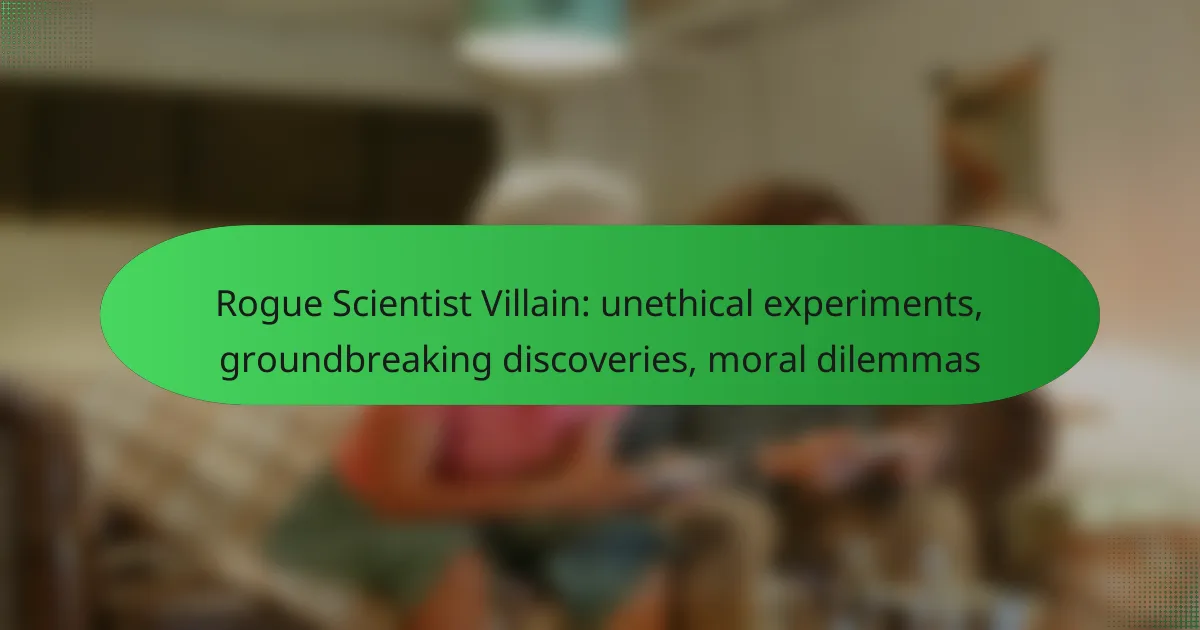Rogue scientists operate at the fringes of ethical research, often prioritizing groundbreaking discoveries over established moral standards. Their unethical experiments can lead to significant advancements, yet they raise profound moral dilemmas as they frequently exploit vulnerable populations and manipulate data. This disregard for ethics not only challenges societal trust but also forces us to confront the consequences of scientific progress devoid of moral consideration.
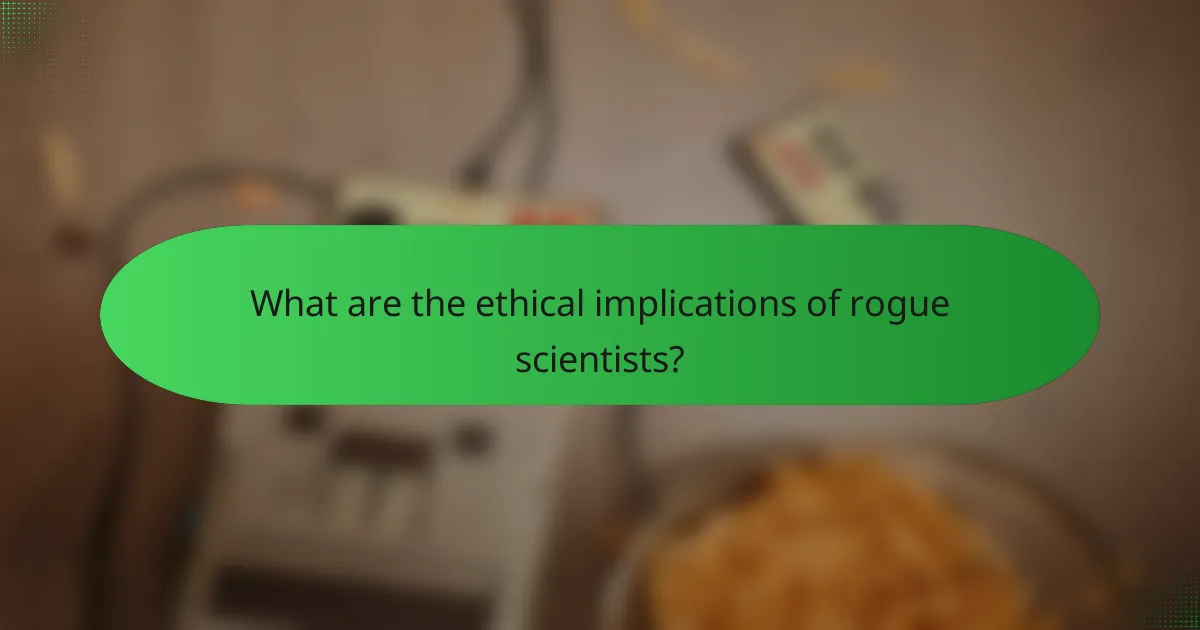
What are the ethical implications of rogue scientists?
The ethical implications of rogue scientists revolve around the disregard for established moral standards in research, leading to potential harm and societal distrust. These scientists often prioritize groundbreaking discoveries over ethical considerations, raising significant moral dilemmas in their work.
Violation of ethical standards
Rogue scientists frequently violate ethical standards set by organizations such as the American Psychological Association or the World Medical Association. These violations can include conducting experiments without informed consent, manipulating data, or using harmful methods that compromise participant safety.
For example, a scientist might bypass ethical review boards to expedite research, risking the well-being of subjects involved. Such actions not only endanger individuals but also undermine the foundational principles of respect and integrity in scientific inquiry.
Impact on public trust
The actions of rogue scientists can severely damage public trust in the scientific community. When unethical experiments come to light, they can lead to skepticism about legitimate research, making it difficult for reputable scientists to gain public support and funding.
For instance, if a high-profile case of unethical research emerges, it may result in widespread fear or distrust regarding similar studies, affecting everything from medical trials to environmental research. Restoring this trust often requires transparency and accountability from the scientific community.
Consequences for scientific integrity
Rogue scientists threaten the integrity of the scientific process by introducing bias and misinformation into research. Their unethical practices can lead to flawed conclusions that misguide further studies and public policy.
Moreover, the fallout from such misconduct can result in stricter regulations and oversight, which may hinder legitimate research efforts. Scientists must navigate these consequences carefully to maintain the credibility of their work and the field as a whole.
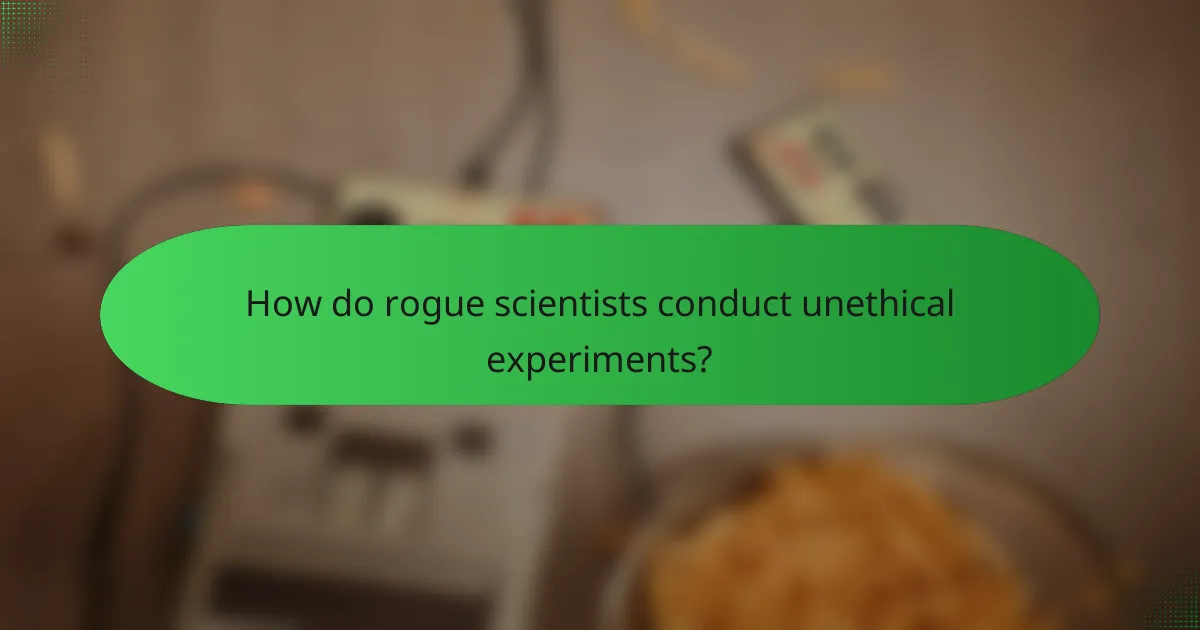
How do rogue scientists conduct unethical experiments?
Rogue scientists often conduct unethical experiments by bypassing established ethical guidelines and regulations, leading to significant moral dilemmas. Their methods can include exploiting human subjects, manipulating data, and taking advantage of vulnerable populations.
Use of human subjects without consent
One of the most egregious practices of rogue scientists is conducting experiments on human subjects without obtaining informed consent. This can involve using individuals who are unaware of their participation in research or who do not fully understand the risks involved.
For example, a rogue scientist might recruit participants under false pretenses or fail to disclose potential side effects of a drug being tested. Such actions violate ethical standards set forth by organizations like the World Medical Association’s Declaration of Helsinki.
Manipulation of data
Rogue scientists may manipulate data to achieve desired outcomes, often skewing results to support their hypotheses. This can include selectively reporting data, altering experimental conditions, or even fabricating results entirely.
Such practices undermine the integrity of scientific research and can lead to widespread misinformation. For instance, a study claiming a breakthrough treatment might omit negative results, misleading both the scientific community and the public.
Exploitation of vulnerable populations
Exploiting vulnerable populations is another tactic used by rogue scientists, often targeting groups with limited resources or power. This can include conducting experiments in low-income communities or among marginalized groups who may not have the means to refuse participation.
These populations may be coerced into participating due to financial incentives or lack of access to healthcare. Ethical research practices emphasize the importance of protecting these individuals, ensuring they are not subjected to undue risk or harm.
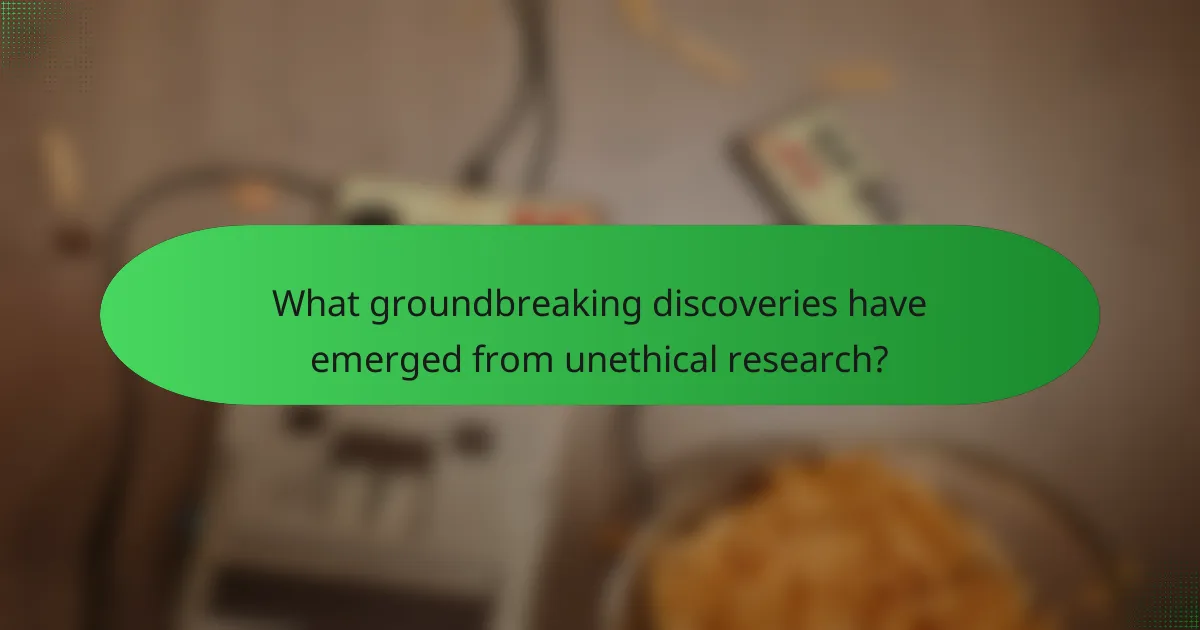
What groundbreaking discoveries have emerged from unethical research?
Unethical research has led to several groundbreaking discoveries that challenge moral boundaries. These advancements often prioritize scientific progress over ethical considerations, resulting in significant innovations but raising serious moral dilemmas.
CRISPR gene editing advancements
CRISPR technology has revolutionized gene editing, allowing for precise modifications in DNA. While its potential to cure genetic disorders is immense, the ethical implications of editing human embryos and the risk of unintended consequences raise significant concerns.
Researchers have made strides in using CRISPR for agricultural improvements, enhancing crop resistance and yield. However, the manipulation of genetic material in living organisms prompts debates about biodiversity and ecological balance.
Cloning breakthroughs
Cloning has progressed significantly, with successful cases of animal cloning leading to discussions about human applications. While cloning can help preserve endangered species, it also poses ethical questions regarding identity and the rights of cloned beings.
Techniques such as somatic cell nuclear transfer have enabled scientists to create genetically identical organisms. This raises concerns about the potential for cloning humans and the moral implications of creating life solely for research or organ harvesting.
Psychological manipulation techniques
Psychological manipulation techniques have advanced through unethical research, particularly in behavioral psychology. These methods can influence decision-making and behavior, often without the subjects’ consent, raising ethical alarms about autonomy and informed consent.
Applications of these techniques can be seen in marketing and political campaigns, where understanding human psychology can lead to effective persuasion. However, the potential for misuse in coercive contexts highlights the need for strict ethical guidelines in psychological research.
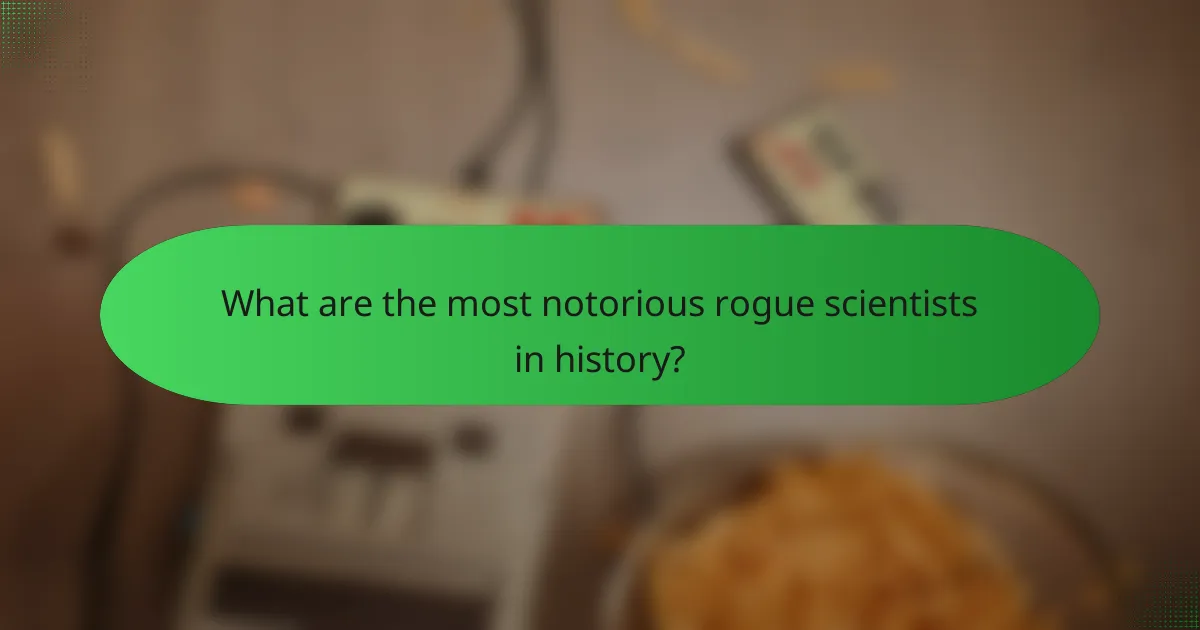
What are the most notorious rogue scientists in history?
Notorious rogue scientists are individuals who have conducted unethical experiments, often leading to groundbreaking yet morally questionable discoveries. Their actions raise significant ethical dilemmas and highlight the potential consequences of scientific misconduct.
Josef Mengele’s experiments
Josef Mengele, known as the “Angel of Death,” conducted inhumane experiments on prisoners at Auschwitz during World War II. His work included genetic studies and surgical procedures without anesthesia, often resulting in severe suffering or death.
Mengele’s experiments aimed to advance the Nazi ideology of racial purity, but they lacked any scientific validity. His actions are a stark reminder of the ethical boundaries that must never be crossed in scientific research.
Andrew Wakefield’s vaccine fraud
Andrew Wakefield published a fraudulent study in 1998 that falsely linked the MMR vaccine to autism, sparking a global anti-vaccine movement. His research was based on manipulated data and conflicts of interest, leading to widespread public health consequences.
Wakefield’s actions not only damaged his credibility but also resulted in a significant decline in vaccination rates, contributing to outbreaks of preventable diseases. This case underscores the importance of integrity and transparency in scientific research.
He Jiankui’s gene-edited babies
He Jiankui claimed to have created the world’s first gene-edited babies in 2018, using CRISPR technology to alter embryos to resist HIV. His announcement was met with international outrage due to the ethical implications and lack of oversight in his research.
Jiankui’s work raised concerns about the long-term effects of gene editing and the potential for unintended consequences. This incident emphasizes the need for strict regulations and ethical guidelines in genetic research to prevent misuse of technology.
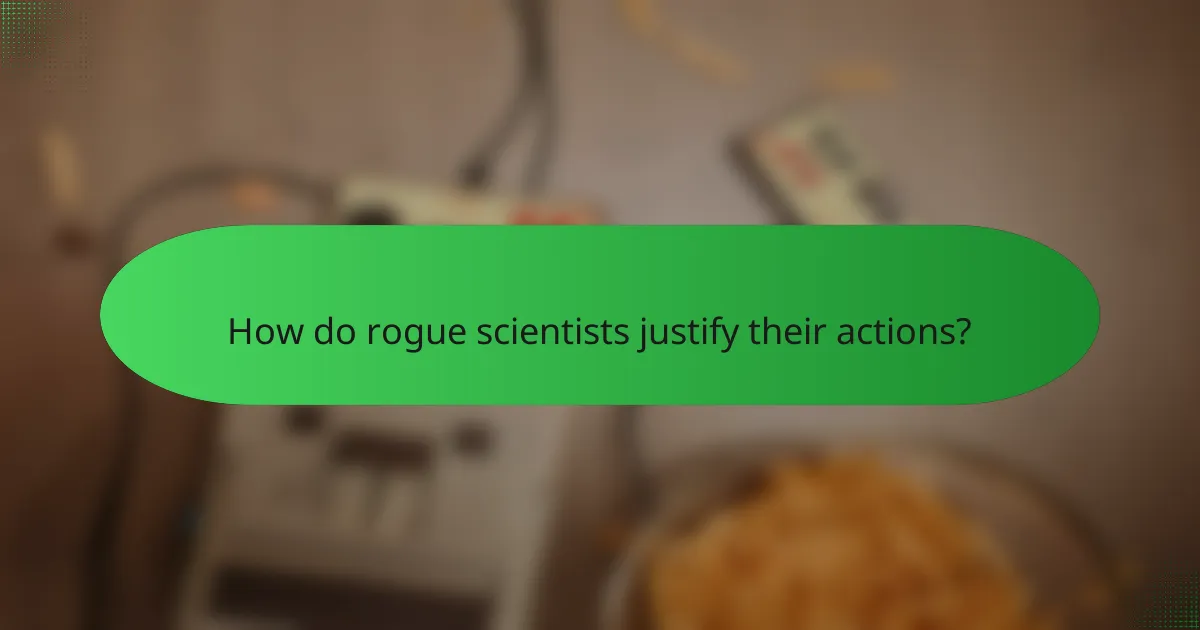
How do rogue scientists justify their actions?
Rogue scientists often rationalize their unethical experiments by believing their work serves a greater purpose, despite the moral implications. They may prioritize groundbreaking discoveries over ethical considerations, leading to significant moral dilemmas.
Belief in greater good
Many rogue scientists convince themselves that their research will ultimately benefit humanity, even if it involves questionable methods. This belief can stem from a desire to solve pressing global issues, such as disease or climate change, where they feel traditional approaches are insufficient.
For instance, a scientist might conduct experiments on human subjects without consent, arguing that the potential medical breakthroughs justify their actions. This mindset creates a dangerous justification for unethical practices, blurring the lines between right and wrong.
Desire for fame and recognition
The pursuit of fame and recognition can drive rogue scientists to engage in unethical behavior. They may seek to publish groundbreaking findings that elevate their status in the scientific community, often at the expense of ethical standards.
In some cases, the pressure to produce results can lead to data manipulation or the omission of negative results, as scientists chase accolades and funding. This desire for notoriety can overshadow the importance of integrity in research.
Financial incentives
Financial motivations can significantly influence the actions of rogue scientists. Funding from private organizations or government grants may come with expectations for rapid results, pushing scientists to compromise their ethics to secure financial backing.
For example, a researcher might prioritize experiments that yield profitable patents over those that are ethically sound. This financial pressure can create a conflict of interest, leading to decisions that prioritize monetary gain over the welfare of subjects involved in the research.
